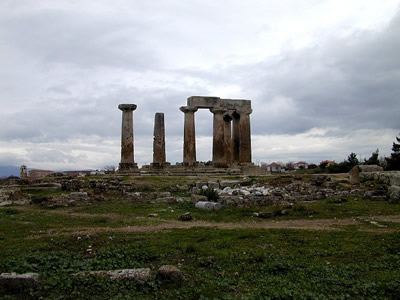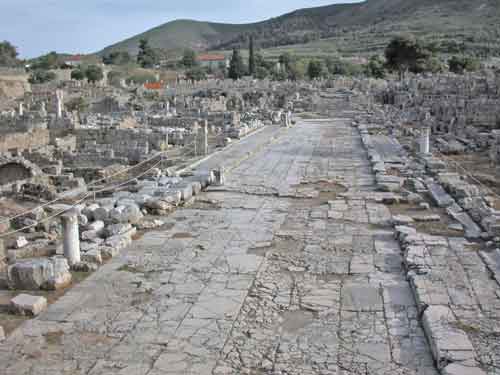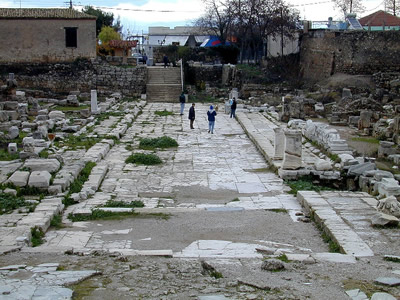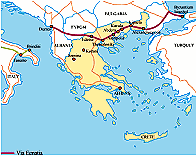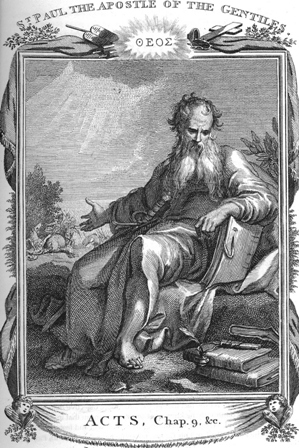PAUL'S TEACHING ON CHRISTIAN COMMUNITY LIVING
Why did Paul write his letters? All of them except for Romans were written to those communities which Paul had founded and to address issues that arose after he had left. The classic example is the Christian community in the city of Corinth. After Paul left various issues and problems arose that made some Christians such as Chloe write to Paul for advice. In replying Paul gave a fairly good picture of how he regarded a Christian community should live and the appropriate conduct for Christians. When we examine the Corinthians letters, Paul could have been easily writing to a modern day church community: marriage, sex, the Eucharist and preaching are still debatable subjects. Yet I am sure Paul would be shocked to know almost 2,000 years later Christians are still reading his letters. Nevertheless we can still hear Paul’s breath as he dictates his letters and so we are drawn very much into those situations he addressed – almost an eyewitness, and that may not be a bad thing for us to picture ourselves this afternoon.
Before examining Paul’s correspondence to the Corinthians there are some pointers that may be helpful in our understanding of Paul’s correspondence to the Corinthians.
1. Paul believed in the parousia, that is the coming of the Lord was imminent. For Paul human history fell into three distinct parts: a. Before the Law; b. During the Law under Christ; c. Between Christ’s ascension until His second coming. So Christians had to be ready for the imminent return of the Lord. For Paul it meant making sure Christians lived in the new creation through baptism as where they found themselves in life. This is why also Paul was not interested in changing the structure of society – if you were a slave, you would not be one for long.
2. Persecution had not begun for Christians by the Roman authority, nor systematically by the Synagogue. It was a relatively peaceful time even though this may not seem to be the case as Paul related his trials.
3. Having been a Pharisee Paul already believed in the resurrection of the body. So Christ’s rising would not have been a problem as he manifested: when Christ comes again the dead will rise with their bodies (I Cor. 4. 5). This will be followed by judgment and glorification (I Thess. 4. 16). Jesus has become the first fruits of those who had died. Christ has destroyed death, that last enemy to be conquered.
4. When Paul spoke of “the flesh” or “the way of the flesh” he meant living contrary to God’s way. So it is not only those deadly sins of gluttony and lust but also those things that have no eternal value that have to be averted in Paul’s terms. In other words those things like grass that wither and decay and die are not to be pursued. It is important that we understand that Paul is not saying that the body is evil – for him that is the temple of the Spirit. To live “in the Spirit” simply means living God’s way. There is nothing of the Manichaeist in Paul.
5. Another point I think we need to make clear is that Paul did not found churches in the way we understand by that word from the Greek ekklesia which for Athenians meant a general assembly of citizens. In the Septuagint ecclesia is also found in the O.T to translate the Hebrew word for “congregation of the Lord” (Deut. 23. 2). When Paul used the word ekklesia he meant the local Christian community ( I Cor. 1. 2, 4. 17, 7.17, 11. 16, 14. 33, 16. 1, 16. 19).
6. Those first and even second generations of the followers of Christ or of the Way as first expressedlived in cities such as Corinth, Ephesus and Philippi, They gathered together in homes of the wealthy to share their knowledge of Christ, to read the Scriptures and to break bread and of course in time to read Paul’s letters. In any of these centres there would have been a number of Christian home communities, or as they would later be called “home churches”. For example in Corinth Chloe, Aquila and Prisca, and Gaius would have been leaders of different communities.
7. In the New Testament there are only two letters to the Corinthians but within that framework most scholars accept there are many letters of Paul to them. So this give us another slant of just how cantankerous these Corinthians were, and how they must have been a thorn in Paul’s side. Indeed we know they must have been cantankerous for a considerable time for at the end of this century, Clement, probably the leading presbyter in Rome, wrote to them and especially to “the self-willed individuals” who have caused an “abominable and unholy schism” (I Clement 1.1).
8. For Paul and indeed for the early Church as a whole the most important aspect of community living was koinonia. As you can see it is derived from koine, meaning “common” and hence as we saw this morning it also meant the common language for the Greeks. The nearest English word to describe this is fellowship. For Paul this common bond should never be broken in a community as it gave unity. That unity came from a common baptism where all were made a member of Christ. But these early Christians did not seem to get it, neither at Corinth or indeed in Philippi as Paul exhorted two leaders, Euodias and Syntyche to resolve their differences so there could be koinonia (4. 2 - 3).
Returning now to the Corinthian community - Paul had first visited Corinth A.D. c 50 and stayed for eighteen months with Aquila and Prisca, and so he was not the first Christian in this commercial and cosmopolitan city. He also made two other visits. Some five years after his first visit while in Ephesus he was forced to write once again ( - he had already written once before -the letter mentioned in I Cor. 5. 9 is lost) because Chloe and perhaps others were writing to him for advice on certain matters such as marriage but also informing him of those who were breaking koinonia. From II Corinthians we know that Paul wrote on various occasions to this community as problems still kept arising. Obviously Paul’s relationship with the Corinthians was indeed a complicated one.
Paul’s response to them is an exercise in pastoral care. Before admonishing them, he wanted them to know they will never have a father as he is to them. Accordingly he addressed them: “I do not write this to make you ashamed, but to admonish you as my beloved children. For though you have countless guides in Christ, you do not have many fathers. For I became your father in Christ Jesus though the gospel” (I Cor. 4.14-15).
“I wrote to you out of much affliction and anguish of heart and with many tears, not to cause you pain but to let you know the abundant love I have for you” (II Cor. 2. 4).
And if we take what he says to the Galatians he is not only a father but also a mother to these early Christians. "My little children, with whom I am again in travail until Christ be formed in you!" (Gal. 4 . 19).
Those recalcitrant Corinthians - those issues that Paul addressed to them are perennial as already intimated. What Paul is seeking in Corinth, is no different than what +Rowan has been trying to do with the Anglican Communion – to preserve unity and sometimes that unity for the sake of Christ comes at great cost. Did they not know that? Do we know it too?
The Corinthians were divided over many things. One was whom to follow? Who was the better preacher? Apollos or Paul? Paul retorts, what rubbish! The Gospel is not about eloquence but about Christ. There is only one Lord. How can we be divided in Christ? There is only one Gospel. Whoever preached the message to you, you only belong to one person – Jesus Christ. (I Cor. 1.13, 3. 22 – 3). There is no division! We are all united in Christ who died for us and rose from the dead to give eternal life.
What is your problem you can almost hear Paul say? Only one can give you salvation that is, Christ. I cannot, nor can Apollos. Christ is our leader and exemplar. So get on with being faithful to Christ.
Another division was over the concept of freedom in Christ. One of the features of Paul’s preaching was that the baptised are made free in Christ. Furthermore in Christ "there is no longer Jew or Greek, no longer slave or free man, no longer male or female, but all are only one in Christ Jesus" (Galatians 3:28). It did not matter whether one was circumcised or uncircumcised as these were immaterial in being that new person in Christ (I Cor. 7. 19). They were no longer subjected to the Law if Jews, and Gentiles obviously took him literally. In believing they were free in Christ many thought they were not obliged to worry about moral issues. However Paul had to confront them that this is not what is meant by freedom. The baptised had obligations to fulfil. That meant honouring the moral code. So Paul took the example of a man marrying his step-mother when his father and her husband had died as not being permissible. The Leviticus Law forbade such marriages of kindred (Lev. 18. 8, 20.11). It should be the same for a Christian and such a person should be removed from the Christian community unless he repented and changed his life-style. Indeed by staying within the community his immoral behaviour acted like leaven. Paul purposely used the leaven imagery to manifest the effect each one’s conduct has on another I Cor. 5. 6 -13). We are our brother’s keeper.
Another division was over marriage and celibacy. Paul appealed to all in the Christian community to conduct themselves in such a way to show that their body is the temple of the Holy Spirit. Do you not know that the Holy Spirit dwells within you? If married, spouses should be faithful to one another; if unmarried which Paul thought was the better course, they should remain that way. Any kind of sexual permissiveness was forbidden (I Cor. 6. 15, 19 – 20). The only situation where a divorce could be granted was if one of the spouses became a Christian and the other (a heathen) did not want to continue with the marriage. However if the spouse was happy to remain with the Christian, let it be so. Paul made it clear that this was his teaching not the Lord’s (7. 12 – 16). After all the sanctity of one spouse does sanctify the other. How we need Paul’s words to be heard to-day in a world of so much promiscuity!
Another division was over the way of living. For Paul once one became a new person in Christ one should lead a life of holiness. It meant metanoia – turning away from the old life of paganism to the new life in Jesus Christ. You can hear Paul chiding them. Don’t you know? Have you forgotten already about that new life you now have in Christ? You now don’t go off to the pagan temple or eat meat sacrificed to idols. What was needed was transformation “All of us … are being transformed into the same image from glory to glory” (II Cor. 3. 18). So allow the Lord gradually to reshape our humanity, and as he would say later to the Romans it is really our mind set that needs to be transformed. “Be transformed by the renewal of your mind, that you may discern what is the will of God, and what is pleasing and perfect” (Rom. 12. 2).
Another division was over charity and behaviour when meeting in homes before the breaking of bread. Indeed we probably would have not known about this aspect of Christian life in Corinth if it had not been for those who got drunk and were mean to the poor. Don’t you know that in the breaking of the bread we are all one in Christ? We are supposed to come in a proper manner to receive the Lord?
We have to remember that Christians could only meet for the agape in the home of the wealthy for only they had the space. What seems to have happened was that before the Agape, friends gathered for a meal. But apparently that was only for the better off. The poorer lots were not invited to the meal and often went hungry. Wrong said Paul. We must share all that we have as we all belong to Christ, and this is what we do when we break bread together. Koinonia, don’t forget is the essence of Christian life (I Cor. 11. 18 – 34).
In what we know as the second letter to the Corinthians Paul stressed the importance of reconciliation. Just as Christ has reconciled all to God by His death, so we too must be reconciled to one another. (II Cor. 5. 18 – 20.
“So, whether you eat or drink or whatever you do, do it all for the glory of God. Do not cause anyone to stumble, whether Jews, Greeks or the Church of God, even as I try to please everybody in every way. For I am not seeking my own good but the good of many, so that they may be saved” (I Cor. 10.31). Indeed in the sharing of the eucharistic bread and cup members of the community become one as they become one body in Christ (I Cor. 10. 16 – 18).
As well as divisions within the Corinthian Church over such matters as we have seen, there were other matters that Paul addressed in living out the credentials of a believer.
The origin of the ecclesiastical courts for clergy and for the Church to prosecute its own can be traced back to this letter to the Corinthians. Paul wanted his Christian community to understand if anyone needs to be disciplined for sins it should be the Christian community that should be the arbitrator. When he heard about disputes being held in the secular courts involving Christians he informed the Corinthians, surely there is someone among you who is competent to arbitrate rather than sending them off to the local secular courts. No Christian should have to appear before a secular court unless he is unrepentant and unremorseful. If this is so, he is then thrown out to defend for himself. But only as a last resort. We have to work hard to keep our brothers and sisters in the fold. Surely Paul is challenging Christians that if we love the Lord, we must do His work, and the one thing we learn from the Gospel about Christ is that He came to change people’s hearts – he did not come to leave a blue print for the future, but to challenge people- metanoia – change completely the way you are living. Put another way, turn from sin and turn to God. It must be that 180 degrees change. This means that the Christian life is one of imitation of Christ who humbled himself even to death on the cross.
We cannot talk about Paul’s advice for Christian community living without speaking about love. As he would sum it all up in 1 Cor. 13 love is the chiefest of all virtues. Most of us are familiar with Paul’s advice – there abides three – faith - hope and love but the greatest is love. “Love is patient, love is kind, love is not envious or boastful or arrogant. It does not insist on its own way, it is not resentful, it does not rejoice in wrongdoing, but rejoices in the truth. It bears all things, believes all things, hopes all things, endures all things” I Cor. 13. 1 – 7). To these recalcitrant Corinthians, he insisted, “Make love your aim” (1 Cor. 14:1) as “The love of Christ controls us” (2 Cor. 5:14).
Love featured prominently in most of Paul’s letters. For example he informed the Christians in Rome “Let love be genuine” (Rom. 12:9); to the Philippians, “[Have] the same love, being in full accord and of one mind” (Phil 2:2); to the Thessalonians, “May the Lord make you increase and abound in love” (1 Thess. 3:12).
Ubi caritas dues ibi est – that Ch. 13 is one we should dwell on often. Perhaps this afternoon?
Although it is a topic in itself, I want to touch on the importance of the Holy Spirit and its gifts in the early Christian community. To the Corinthians Paul wanted them to understand that once they have become Christians through baptism, it is this Spirit that is the basis for all communication and fellowship amongst members (I Cor. 12. 10 -14). This Christian community could only be faithful through the power of the Holy Spirit. It is this agent of God that makes up for human weakness, articulates the prayers of the community and is the giver of gifts. “It is the Spirit that gives life” ( II Cor. 3. 6).
Paul articulated that within a community various gifts are given to individuals. To each is given the manifestation of the Spirit for the common good. (I Cor. 12. 4 – 7) For some this is wisdom, to another knowledge, to another faith, to another gifts of healing, to another the working of miracles, to another prophecy, to another discernment, to another the gift of tongues and to another interpretation of tongues. This means putting one’s gift to the service of others. No doubt this passage gives us a glimpse of the kind of Christian community in Corinth where many were ministering, both women and men in their appointed way. Perhaps it was the first charismatic community?
Paul also wanted to protect his Christian communities against those who brought a tainted version of the Gospel. As he had preached the true Gospel to the Corinthian, Christians, he had betrothed them to Christ. So they should have been faithful after he left them. Instead they had been deceived too by the cunning seduction of the serpent in the guise of visiting preachers who have brought another gospel by another spirit. Obviously these preachers had rhetorical skills and persuasive words. Paul guessed their manner of delivery was better than his, but their knowledge certainly was not. He was the one who taught Christ crucified who had arisen from death. That is the only belief that will give you eternal life. So don’t be seduced as your parents were (II Cor. 11. 1- 6). These words of Paul are so important for us today, not only from those who do not preach the true Gospel such as from fundamentalists but also those who pervert it in subtle ways from not really understanding the whole concept and origin of the New Testament message.
Furthermore Paul wished his Christian brothers and sisters to be free of contamination from and influence of heathens. Once being baptised one no longer lives in the darkness and therefore one should not seek out the company of pagans. Why would you, we can hear Paul exclaim: You have been enlightened, and now live in the light that judges all our actions (II Cor. 6. 14). Likewise Paul would say to us to-day, are we free from the contamination of secularism and materialism? What is the whole motive for our every day living? Is it not to manifest Christ’s love?
Likewise Paul would say to us to-day, are we free from the contamination of secularism and materialism? What is the whole motive for our every day living? Is it not to manifest Christ’s love?
For Paul the importance of the Christian community lies not in what it is, but in what it is called to do and be as he conveyed to the Corinthians. That is still the challenge today in whatever circumstances we find ourselves. Paul’s final words I am sure would be, we have been made a new creation in Christ – let us live as if we believe that we are that new creation (II Cor. 5. 17). “We have this treasure in earthen vessels, to show that the transcendent power belongs to God and not to us” ( II Cor. 4. 7).
Brothers and sisters, … Mend your ways, heed my appeal, agree with one another, live in peace, and the God of love and peace be with you. Greet one another with a holy kiss. The grace of the Lord Jesus Christ and the love of God and the fellowship of the Holy Spirit be with you all (II Cor. 13. 11 – 14).
Would not Paul be surprised if he knew this is the way we begin each celebration of the Eucharist. The whole Christian experience is as old as Paul’s letters.
We owe so much to Paul about being a Christian. During this year set aside to discover more about the apostle who shaped the essence of Christian belief, far more than his co-martyr, Peter ever did, let us open our hearts to what Paul poured out from his to those early Christians in Corinth and elsewhere.
Marianne Dorman
Returnh to Index
